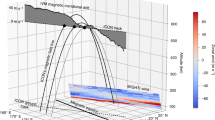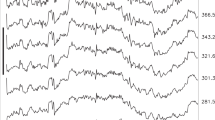Abstract
IN the most recent analysis of the Earth's magnetic field (for the epoch 1942), Spencer Jones and Melotte1 evaluated forty-eight coefficients in the spherical harmonic expansion of the magnetic potential. Using their values for a spheroidal Earth, the X (northerly) and Y (easterly) components of the Earth's magnetic field were calculated at heights of 100 km. and 250 km. above the Earth's surface for θ = 5°, 10°, 15°, 20° and 25° and for ϕ = 240°, 250° and 260° E., where θ and ϕ are the co-latitude and longitude respectively. The heights 100 and 250 km. were chosen to correspond to the E- and F-layers of the ionosphere. For the purpose of comparison, X and Y were also evaluated at the Earth's surface and in every case the value of H = (X 2 + Y 2)1,2 was computed.
This is a preview of subscription content, access via your institution
Access options
Subscribe to this journal
Receive 51 print issues and online access
$199.00 per year
only $3.90 per issue
Buy this article
- Purchase on Springer Link
- Instant access to full article PDF
Prices may be subject to local taxes which are calculated during checkout
Similar content being viewed by others
References
Spencer Jones, H., and Melotte, P. J., Mon. Not. Roy. Astro. Soc., Geophys. Supp., 6, 409 (1953).
Author information
Authors and Affiliations
Rights and permissions
About this article
Cite this article
JACOBS, J. Effect of Altitude on the Position of the Magnetic Pole. Nature 178, 35–36 (1956). https://doi.org/10.1038/178035b0
Issue Date:
DOI: https://doi.org/10.1038/178035b0
Comments
By submitting a comment you agree to abide by our Terms and Community Guidelines. If you find something abusive or that does not comply with our terms or guidelines please flag it as inappropriate.



